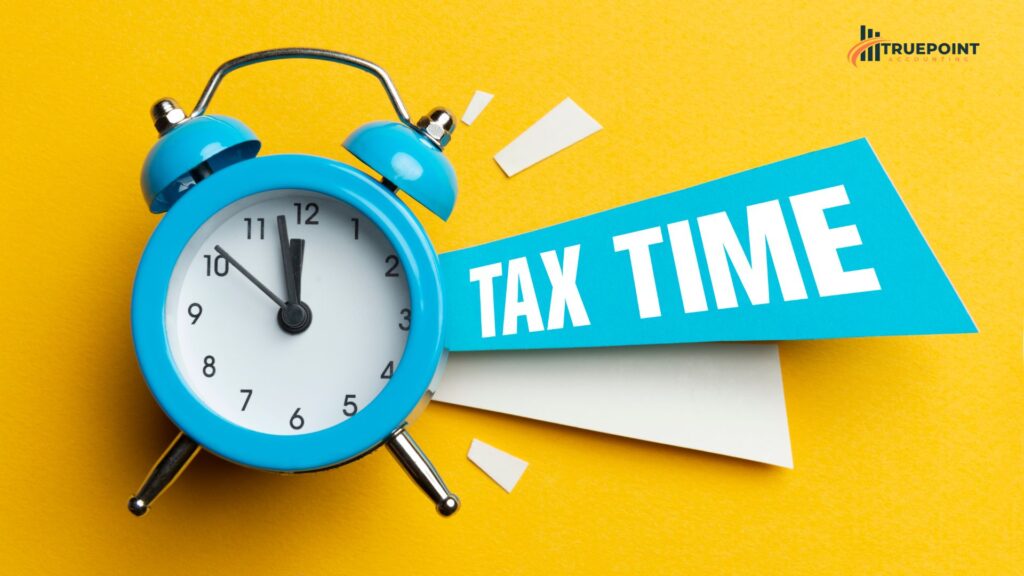Bookkeeping Best Practices to Prepare for Tax Season

Tax season doesn’t have to feel like a surprise attack. In fact, with the right bookkeeping practices, it can be smooth, stress-free—and even save you money.
For small business owners and entrepreneurs, staying ahead of tax season starts with having organized, accurate financial records. At TruePoint Accounting, we help clients do just that—by building strong bookkeeping systems that make tax time less about scrambling and more about strategy.
Here are the best bookkeeping practices you can adopt now to make tax season easier, faster, and more cost-effective.
✅ 1. Keep Business and Personal Finances Separate
If you’re still mixing business and personal transactions, tax prep is going to be a headache. Not only does it create confusion, but it can also raise red flags during an audit.
Action Steps:
- Open a dedicated business bank account and credit card
- Avoid making personal purchases through business accounts
- Pay yourself with scheduled distributions or a set salary
💡 Example: A solopreneur who separates finances finds it 10x easier to track deductible business expenses and avoid misreporting income.
✅ 2. Record Transactions in Real Time
One of the biggest mistakes business owners make is waiting until year-end to log transactions. By then, it’s hard to remember what was spent where—or why.
Action Steps:
- Use cloud-based bookkeeping tools like QuickBooks, Xero, or Wave
- Log income and expenses weekly
- Upload or scan receipts right after a purchase
💡 Example: A contractor who scans receipts immediately and links them to their accounting software ensures nothing is lost—and every deduction is claimed.
✅ 3. Categorize Expenses Correctly
When tax season hits, correctly categorized expenses make a big difference. It helps you maximize deductions and ensure compliance with IRS guidelines.
Common Expense Categories:
- Office supplies
- Advertising & marketing
- Travel & meals (business-related)
- Software subscriptions
- Contractor payments
- Utilities and rent
Action Steps:
- Use a consistent chart of accounts
- Avoid the “miscellaneous” category—be specific
- Consult your bookkeeper or accountant if unsure where something goes
✅ 4. Reconcile Your Bank Accounts Monthly
Reconciliation helps ensure that your books match your bank statements. If you don’t reconcile regularly, you may miss errors, duplicates, or fraud—and your tax return may contain inaccurate numbers.
Action Steps:
- Compare all transactions in your books with your bank and credit card statements
- Investigate and correct any discrepancies
- Reconcile monthly, not just at year-end
💡 Example: A business owner who reconciles monthly catches an accidental double payment to a vendor, corrects it, and gets a refund before it becomes a bigger issue.
✅ 5. Track Tax-Deductible Expenses Year-Round
Too many deductions are missed because receipts get lost or expenses aren’t tracked. Good bookkeeping ensures you claim every dollar you’re entitled to.
Deductible Examples:
- Home office expenses
- Mileage and travel for business
- Equipment and technology
- Professional development and memberships
Action Steps:
- Use a mileage tracker app (like MileIQ or Everlance)
- Digitally store receipts
- Work with a bookkeeper to identify hidden deductions
✅ 6. Issue 1099s on Time
If you hire independent contractors or freelancers, you may be required to file Form 1099-NEC. Failing to do so can result in hefty IRS penalties.
Action Steps:
- Track contractor payments throughout the year
- Collect W-9 forms early
- Issue 1099s by January 31st
- Use your bookkeeping software to generate and send them
💡 Example: A small business that tracked contractor payments through QuickBooks completed 1099s in one afternoon instead of spending days gathering data.
✅ 7. Run Financial Reports Before Year-End
Don’t wait until April to find out where your business stands. Running reports in Q4 allows you to plan strategically—and minimize your tax bill.
Key Reports to Review:
- Profit & Loss Statement
- Cash Flow Statement
- Balance Sheet
Action Steps:
- Review income vs. expenses
- Identify opportunities to defer income or accelerate deductions
- Schedule a meeting with your accountant in December
💡 Example: An entrepreneur reviewed their P&L in November and realized they were headed for a higher tax bracket. They prepaid for equipment, saving money while staying compliant.
🔍 Final Thoughts: Tax Season Starts Now
The best way to prepare for tax season isn’t to panic in March—it’s to build a solid bookkeeping foundation today.
When your books are clean, organized, and accurate:
✅ You reduce stress
✅ You save money
✅ You avoid penalties
✅ You position your business for smart growth
At TruePoint Accounting, we help business owners and entrepreneurs stay financially prepared and tax-ready year-round.
💬 Need help getting your books in shape for tax season? Visit TruePoint Accounting and let’s make this your smoothest tax season yet.
📣 What’s your go-to tip for staying tax-ready? Share it in the comments! Let’s help each other win tax season—together. 💼📊💸
